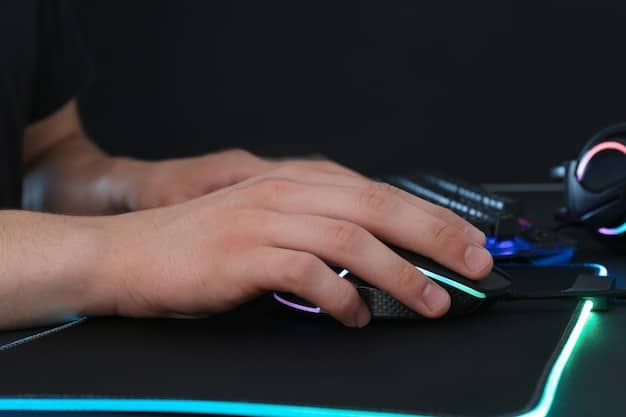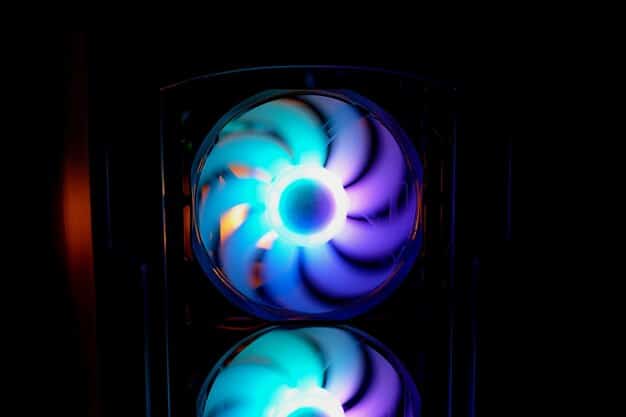New Anti-Cheat Software: Impact on PC Gaming Performance in 2025?

The latest anti-cheat software in 2025 is engineered to combat growing sophistication in cheating, leading to concerns about its potential impact on PC gaming performance due to increased system resource utilization and kernel-level access for enhanced detection capabilities.
The landscape of online PC gaming is constantly evolving, with developers locked in an eternal struggle against cheaters. As cheating methods become more sophisticated, so too must the countermeasures. This naturally leads to questions about the collateral effects these advanced systems might have. A pertinent question on every gamer’s mind is: Is the New Anti-Cheat Software Impacting PC Game Performance in 2025? This article delves into the complexities of modern anti-cheat technologies, their operational demands, and the tangible effects they could have on your gaming experience in the coming year.
The Evolution of Anti-Cheat Technology in 2025
The battle against unauthorized modifications in competitive gaming has been a cat-and-mouse game for decades, but 2025 marks a significant pivot. Anti-cheat solutions aren’t just reacting to cheats; they are proactively integrating machine learning and AI to anticipate and neutralize threats. This shift demands a more pervasive presence within the operating system.
One of the most notable developments is the widespread adoption of kernel-level anti-cheat. Unlike user-mode anti-cheat, which operates at the same privilege level as the game, kernel-level solutions run at the core of the operating system. This grants them unparalleled access to system resources and processes, making it significantly harder for sophisticated cheats to hide. This deep integration, while effective against cheats, raises questions about system overhead. Developers argue it’s a necessary evil to maintain fair play, but players often worry about the trade-offs in performance.
Kernel-Level Access: A Double-Edged Sword
Kernel-level anti-cheat operates by having direct access to your system’s hardware and software, monitoring everything to detect anomalies characteristic of cheating. This level of access is what makes it so robust against modern cheating tools that can inject code or manipulate game memory without being detected by less privileged anti-cheat. However, this also means the anti-cheat is constantly running in the background, consuming CPU cycles and memory.
This persistent vigilance means that even when you’re not actively playing a game, the anti-cheat driver might still be loaded, potentially affecting system startup times or background application performance. The promise is a cleaner, fairer gaming environment, but the cost could be a slight, yet noticeable, degradation in overall system responsiveness. Gamers with older hardware or systems already struggling with resource management are likely to feel this impact most acutely.
- Enhanced Detection: Unparalleled ability to identify and block advanced cheats.
- Deep System Integration: Operates at the core of the OS for comprehensive monitoring.
- Resource Consumption: Requires CPU cycles and RAM for continuous operation.
- Always-on Monitoring: May run in the background even when the game is closed.
Ultimately, the advancements in 2025’s anti-cheat are a testament to the industry’s commitment to competitive integrity. This comes with a necessary evaluation of how these powerful tools interact with diverse PC configurations, ensuring that fair play doesn’t inadvertently disadvantage legitimate players. The ultimate goal is to find a balance where security doesn’t compromise the gaming experience.
The Mechanics: How Anti-Cheat Software Works under the Hood
Understanding the potential performance impact requires a glimpse into the actual mechanisms of modern anti-cheat solutions. They are far more complex than simple signature-based detection. Contemporary anti-cheat systems employ a multi-layered approach, combining real-time memory scanning, behavioral analysis, and network packet inspection.
At its core, a 2025 anti-cheat solution actively scans your computer’s memory for known cheat signatures or suspicious code injections. This isn’t a passive scan; it’s an ongoing process that uses specific algorithms to identify patterns of irregular behavior. Beyond memory, these systems analyze player input and in-game actions for unnatural precision or timing, often indicative of aimbots or wallhacks. This behavioral analysis is particularly data-intensive, requiring constant processing of game-state information.
Real-time Monitoring and System Overhead
The continuous nature of anti-cheat monitoring contributes significantly to system overhead. Every frame, every input, every network packet can be scrutinized. This isn’t just about identifying cheats; it’s about building a profile of legitimate player behavior versus anomalous actions.
- Memory Scans: Constant checking of game and system memory for cheat code.
- Behavioral Analysis: Algorithmic detection of unnatural player actions.
- Network Packet Inspection: Monitoring data sent to and from game servers for irregularities.
- Kernel-Mode Hooks: Intercepting system calls to detect modifications at a fundamental level.
The implementation of these techniques varies between developers. Some might opt for more aggressive, resource-heavy scanning, while others prioritize a lighter touch. Regardless, the sophisticated nature of these operations means that your CPU and RAM are constantly engaged in supporting the anti-cheat alongside the game itself. This concurrent processing can inevitably lead to a reduction in available resources for the game, manifesting as lower frame rates, stuttering, or increased loading times, especially on hardware that is at or near its performance limits. Developers are continuously working to optimize these systems, but the sheer complexity of the task ensures an ongoing challenge.
Identifying Performance Bottlenecks and Their Causes
Pinpointing the exact cause of performance degradation in PC gaming can be challenging, but with the advent of advanced anti-cheat software in 2025, it’s a critical area of investigation. The overhead introduced by these systems isn’t always immediately obvious and can manifest in subtle ways, making it hard for players to isolate the root cause. However, careful observation and monitoring can reveal tell-tale signs.
One of the primary bottlenecks is often CPU utilization. Kernel-level anti-cheat, by its nature, demands significant processing power to constantly monitor system and game processes. This can lead to a higher baseline CPU usage, leaving fewer cycles for the game itself. The result can be reduced frame rates, particularly in CPU-heavy games or scenarios with many on-screen entities. Another significant factor is memory usage. Anti-cheat software requires its own dedicated memory space to operate effectively. While individual memory footprints might seem small, when combined with the game, operating system, and other background applications, it can push systems with limited RAM to their limits, causing aggressive page filing and further performance drops.
Common Performance Symptoms and Hardware Considerations
Players might experience a range of symptoms if anti-cheat is indeed impacting their performance. These include noticeable frame rate drops, especially during intense action or when new assets are loaded. Stuttering or micro-stutters, where the game briefly freezes or hitches, can also be a sign of the anti-cheat interfering with game processes. Longer loading times are another indicator, as the anti-cheat might be performing extensive scans during initial game startup or level transitions.
For older systems, or those running components near their end-of-life, these impacts are amplified. A system that barely met minimum requirements previously might struggle significantly with the added anti-cheat overhead. Even high-end systems can see marginal but perceptible dips in peak performance, affecting players who demand the highest frame rates for competitive play.
The key is to use performance monitoring tools to overlay CPU usage, RAM usage, and frame rates while playing. Look for:
- Elevated CPU Usage: Particularly during periods of game inactivity or menu navigation.
- Increased RAM Consumption: A higher baseline memory footprint for your system.
- Inconsistent Frame Pacing: Sudden drops or erratic frame times, even in stable environments.
- Disk Activity: Unusual disk reads/writes that aren’t tied to game loading.
Ultimately, while anti-cheat is essential, its implementation must be carefully balanced with performance considerations. Developers are continually refining these systems, but players must also be aware of the potential for impact, especially as hardware ages or new, more demanding anti-cheat versions roll out.

Real-World Data and Community Feedback in 2025
While technical explanations offer insight, the true measure of anti-cheat impact lies in real-world data and the collective experience of the gaming community. In 2025, with anti-cheat software becoming increasingly pervasive and sophisticated, community feedback has become a vital barometer for assessing its performance footprint. Forums, social media, and dedicated subreddits are rife with discussions, benchmarks, and anecdotal evidence concerning the subject.
Many players report an immediate, albeit sometimes subtle, drop in frame rates after new anti-cheat updates or game launches incorporating these systems. These reports are often accompanied by specific system configurations, offering valuable context. For instance, players with mid-range CPUs from previous generations frequently note a higher CPU utilization and more pronounced stuttering compared to those with top-tier, newer processors. Furthermore, some users have meticulously documented performance metrics before and after the introduction of new anti-cheat, showing measurable decreases in average and 1% low frame rates.
Game Developers’ Responses and Ongoing Optimizations
Game developers are not oblivious to these concerns. Many studios actively monitor player feedback and performance data to identify and address potential issues. In 2025, it’s common for developers to release patches specifically targeting anti-cheat optimization, seeking to reduce its impact without compromising its effectiveness. This often involves refining scanning algorithms, optimizing background processes, and improving resource management.
However, the challenge remains significant. Balancing robust cheat detection with minimal performance overhead is a constant tightrope walk. Developers must contend with the ever-evolving nature of cheats, which requires continuous updates to anti-cheat systems. This iterative process means that performance concerns are an ongoing dialogue within the PC gaming community.
Key observations from community feedback often highlight:
- Hardware Specificity: Performance impacts tend to be more severe on older or less powerful hardware.
- Patch Cycles: Optimizations and new issues frequently arise with anti-cheat updates.
- Driver Conflicts: Rare but impactful interactions with specific hardware drivers.
- Memory Pressure: High RAM usage reported in conjunction with performance dips.
The collective voice of the gaming community plays a crucial role in shaping the development and optimization of anti-cheat tools. As technologies advance, this symbiotic relationship between players and developers will be essential in navigating the complex intersection of security and performance.
Strategies for Mitigating Performance Impact
For PC gamers concerned about the potential performance impact of new anti-cheat software in 2025, there are several strategies that can help mitigate these effects. While completely eliminating the overhead might not be possible due to the nature of the software, optimizing your system and game settings can significantly improve your experience.
The first step is always to ensure your system drivers are up to date. Graphics card drivers, chipset drivers, and even network drivers can all influence overall system stability and performance. Outdated drivers can lead to inefficiencies that are exacerbated by any additional system load, including that from anti-cheat software. Regularly checking for updates from your hardware manufacturers is a simple yet crucial maintenance task. Another vital strategy is to close unnecessary background applications. Every running program consumes CPU cycles and RAM, leaving fewer resources for your game and the anti-cheat. While gaming, turn off browsers, streaming services, and any other non-essential software.
Hardware Upgrades and Software Optimizations
If software optimizations aren’t sufficient, hardware upgrades might be necessary. More powerful CPUs, especially those with higher core counts and clock speeds, can better absorb the anti-cheat overhead without significant impact on game performance. Increasing your system’s RAM is also a highly effective upgrade, particularly if you find your memory usage is consistently high during gameplay. Moving from 8GB to 16GB, or even 32GB for power users, can provide ample headroom for demanding games and anti-cheat processes.
On the software side, consider adjusting your in-game settings. While you might prefer to play at maximum fidelity, scaling back certain graphics options, such as shadow quality, anti-aliasing, or texture detail, can free up significant GPU resources. This allows your CPU to focus more on game logic and anti-cheat processing, potentially balancing the load better.
Consider the following steps to optimize your setup:
- Driver Updates: Keep all system and hardware drivers current.
- Background Processes: Minimize non-essential applications running concurrently.
- In-game Settings: Optimize graphics settings for a balance between visuals and performance.
- Hardware Monitoring: Use tools to track CPU, GPU, and RAM usage to identify bottlenecks.
- Disk Optimization: Ensure games are installed on fast SSDs to minimize loading times.
While anti-cheat software is a necessary component of modern online gaming, proactive measures can help ensure that its presence doesn’t unduly detract from your gaming performance. A well-maintained and optimized system is your best defense against performance dips.

The Future Landscape: Balancing Security and Performance
As we look beyond 2025, the ongoing challenge for game developers and anti-cheat providers will be to strike an increasingly delicate balance between robust security and optimal gaming performance. The arms race against cheaters shows no signs of slowing down, meaning anti-cheat solutions will continue to evolve, likely becoming even more integrated and sophisticated. The key question for the future is how these advancements will impact the broader PC gaming ecosystem.
One potential direction is the development of more intelligent, adaptive anti-cheat systems. Instead of constant, aggressive scanning, future solutions might leverage advanced machine learning models to identify suspicious behavior with greater precision, only engaging more resource-intensive scans when warranted. This “on-demand” approach could significantly reduce passive performance overhead. Another area of innovation could be cloud-based anti-cheat processing. By offloading some of the heavy computational tasks to remote servers, the burden on individual client PCs could be lessened, allowing for more aggressive detection without local performance penalties. However, this introduces new challenges related to network latency and data privacy.
The Role of Hardware and Operating System Innovations
Hardware manufacturers and operating system developers also have a crucial role to play. Future CPUs might include dedicated hardware acceleration for security tasks, similar to how modern processors handle encryption. This could allow anti-cheat software to run with minimal impact on general CPU performance. Operating systems could also offer more sophisticated APIs for anti-cheat integration, allowing these tools to operate effectively without requiring full kernel-level access, or providing more controlled and optimized ways to interact with system resources.
The dialogue between players, developers, and hardware manufacturers is essential for shaping this future. Feedback on performance impacts and privacy concerns will continue to drive innovation. The aim is to create an environment where competitive integrity is maintained without legitimate players feeling penalized by intrusive or resource-hungry security solutions.
Key future considerations include:
- Adaptive AI: More intelligent anti-cheat that targets suspicious activity.
- Cloud Computing: Offloading detection tasks to external servers to reduce local load.
- Hardware-level Security: Dedicated CPU features for anti-cheat acceleration.
- OS Integration: Improved APIs for secure and efficient anti-cheat operation.
Ultimately, while new anti-cheat software in 2025 presents challenges, the industry’s commitment to fair play and a superior gaming experience is unwavering. The pursuit of balance will continue to drive solutions that both secure and enhance the digital battlegrounds of tomorrow.
Privacy Concerns and Anti-Cheat Software
Beyond performance implications, the increased sophistication and kernel-level access of anti-cheat software in 2025 inevitably raise significant privacy concerns among PC gamers. When a piece of software operates at the core of your operating system, it has the potential to monitor a vast array of activities, extending beyond just the game itself. This deep access is necessary for effective cheat detection, but it also necessitates a critical discussion about data collection, storage, and usage.
Gamers regularly question what data anti-cheat solutions collect, how long it is retained, and whether it could be accessed by third parties. While developers typically provide privacy policies outlining their data practices, the technical complexities often make it difficult for an average user to fully comprehend the scope of data collection. Kernel-level access theoretically allows anti-cheat to see almost everything happening on a system, from other running applications to browsing history, though companies typically assure users that their systems are designed strictly for cheat detection. The tension between the need for security and the right to privacy is a constant challenge for the industry.
Transparency and User Trust
Building and maintaining user trust is paramount for widespread adoption and acceptance of these powerful tools. Developers must strive for greater transparency regarding the precise mechanisms of their anti-cheat software and the data it accesses. Clear, concise, and easily understandable privacy policies are a good starting point, but they must be backed by verifiable practices.
Regular audits by independent security firms could also help alleviate concerns, offering external validation that anti-cheat systems are operating as advertised and not overstepping their bounds. Furthermore, providing users with more control over their data or offering opt-out options where feasible (without compromising the integrity of competitive play) would be a significant step toward addressing privacy worries. Without trust, even the most effective anti-cheat solution can face significant community backlash and resistance.
- Data Collection Scope: What specific data points are being accessed and recorded?
- Data Retention Policies: How long is collected data stored, and by whom?
- Third-Party Access: Is any collected data shared with external entities?
- Vulnerability to Exploits: Could kernel-level anti-cheat itself become a security vulnerability?
The privacy debate surrounding anti-cheat software is not merely a side note; it’s a fundamental aspect of its long-term viability and acceptance. As anti-cheat systems become more powerful, the responsibility to safeguard user privacy must grow in equal measure.
| Key Aspect | Brief Description |
|---|---|
| 🛡️ Kernel-Level Access | Deep system integration for robust cheat detection, but higher resource demand. |
| 📉 Performance Impact | Potential for CPU/RAM overhead, leading to lower FPS, stutters, especially on older PCs. |
| 🕵️♂️ Privacy Concerns | Extensive system monitoring raises questions about data collection and user trust. |
| ⚙️ Mitigation Strategies | Driver updates, background app closure, hardware upgrades, and in-game setting tweaks. |
Frequently Asked Questions About Anti-Cheat and Performance
Not always significantly, but it typically introduces some overhead due to deep system monitoring. The actual impact varies based on the anti-cheat’s optimization, your PC’s hardware specifications, and the game itself. More powerful systems might experience negligible effects, while older or less robust PCs could see more noticeable frame rate drops or stuttering.
Generally, no. Anti-cheat software is often mandatory for online multiplayer games to ensure fair play, and attempting to disable it will prevent you from accessing online servers. Some anti-cheat runs as a persistent background process, even when the game isn’t active, making it difficult to fully remove without uninstalling the game.
The CPU and RAM are typically the most affected components because anti-cheat software constantly monitors system processes and memory. A higher baseline CPU utilization can reduce available processing power for the game, leading to lower frame rates. Increased RAM consumption can stress systems with limited memory, causing further performance degradation.
Yes, kernel-level access grants anti-cheat software deep system visibility, raising privacy concerns about data collection beyond game-related activities. While developers generally state they only collect data for cheat detection, users often worry about the full scope of monitoring and data handling. Transparency and trust are crucial in addressing these legitimate concerns.
To minimize impact, ensure all your drivers are updated, close unnecessary background applications while gaming, and consider optimizing your in-game graphics settings. For older systems, hardware upgrades like a more powerful CPU or additional RAM can significantly alleviate performance bottlenecks caused by anti-cheat software.
Conclusion
The advancements in anti-cheat software by 2025 represent a necessary evolution in the constant battle for competitive integrity in PC gaming. While these sophisticated systems, particularly those operating at the kernel level, undeniably introduce a degree of performance overhead and raise valid privacy concerns, they are critical to ensuring a fair playing field for everyone. The impact on individual systems can vary greatly, with older or less robust hardware feeling the effects more acutely. However, through vigilant system optimization, strategic hardware upgrades, and an ongoing dialogue between developers and the gaming community, the industry strives to balance robust security with an uncompromised gaming experience. The future will likely see even smarter, more adaptive solutions that minimize intrusive practices while maximizing detection capabilities, ultimately benefiting all legitimate players.





